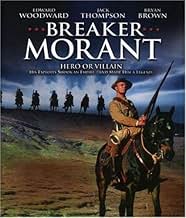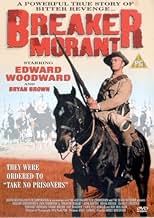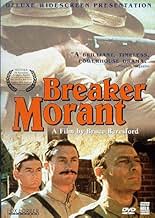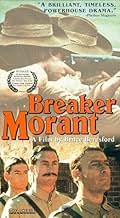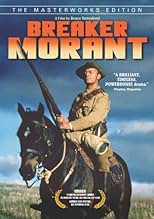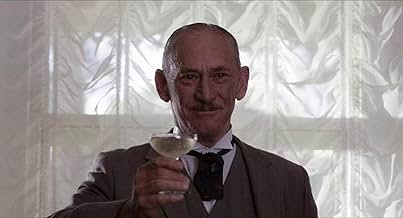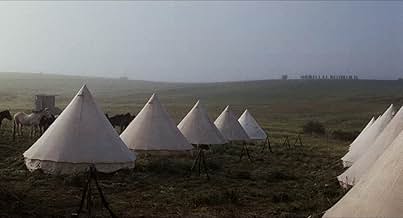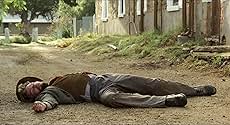CALIFICACIÓN DE IMDb
7.8/10
15 k
TU CALIFICACIÓN
Tres tenientes australianos son sometidos a un consejo de guerra por ejecutar a prisioneros como una forma de desviar la atención de los crímenes de guerra cometidos por sus oficiales superi... Leer todoTres tenientes australianos son sometidos a un consejo de guerra por ejecutar a prisioneros como una forma de desviar la atención de los crímenes de guerra cometidos por sus oficiales superiores.Tres tenientes australianos son sometidos a un consejo de guerra por ejecutar a prisioneros como una forma de desviar la atención de los crímenes de guerra cometidos por sus oficiales superiores.
- Dirección
- Guionistas
- Elenco
- Nominado a 1 premio Óscar
- 13 premios ganados y 8 nominaciones en total
Charles 'Bud' Tingwell
- Lt. Col. Denny
- (as Charles Tingwell)
Opiniones destacadas
When I watched this finely acted movie, I wasn't really too knowledgeable about the Boer War so I didn't know how historically accurate the film was. However, from reading the posts, it seems more knowledgeable posters then myself agree that the filmmakers were very authentic in their endeavors. Most pertinently, even though the story is about the General Staff scapgoating the three Australian lieutenants to cover their own practice of ordering Boer prisoners shot, in a war obviously long since concluded, its relevance is timeless and universal as soldiers in all times and places are asked to do things that conflict with their consciences. Breaker Morant shows this very powerfully. 9/10.
Edward Woodward, better known to American audiences as the Equalizer, plays the title role in this military courtroom drama set during the Boer War. Woodward who had a well known reputation as a rollicking writer of the Australian frontier was one of three men charged with murdering several prisoners during the Boer War, one of them happened to be a German missionary. That got Kaiser Wilhelm's back up and the British were not looking for intervention from him on the Boer side. One must remember that the Germans did have a presence in Africa at the time. The diplomatic situation was not unlike the Korean War before the Chinese intervened.
What to do, but find someone to take the fall. Certainly not Lord Kitchener the commander of British forces in South Africa who let it be known quite unofficially and not on paper for attribution that he really wouldn't care if Boer Prisoners were shot. Edward Woodward, Bryan Brown and young Lewis Fitzgerald, get selected for a court martial. This is not unlike the more famous incident in the French Army during World War I as depicted in Paths of Glory.
The Australians to this day feel that these men were singled out because they were Australians and not British. Wouldn't do to have His Majesty's subjects, let alone the commander be held responsible. While the Boer War was going on, the various colonies on the Australian continent coalesced and formed a nation. Why the Australian government didn't protest more vigorously is something I'm not quite understanding.
That however does not detract from Breaker Morant being the fine film it is with sterling performances all around. Jack Thompson is the defense attorney in this court martial and does a splendid job in the face of a stacked deck.
Alan Cassell is a bloodless Kitchener covering his own rear at all costs and Vincent Ball plays Sir Ian Hamilton who was Kitchener's aide at the time. Australia would meet these two later on under far worse circumstances as Kitchener was War Minister in the Asquith cabinet during World War I and Ian Hamilton was the commander-in-chief of the Gallipoli Expedition where so many ANZACS died in another foreign battlefield for another cause not really their concern. Hamilton is shown as quite the rat here, helping to cover his boss's complicity.
I recommend Breaker Morant mostly for those who are not Australian so they can acquaint themselves with a sad and bitter chapter in that nation's life.
What to do, but find someone to take the fall. Certainly not Lord Kitchener the commander of British forces in South Africa who let it be known quite unofficially and not on paper for attribution that he really wouldn't care if Boer Prisoners were shot. Edward Woodward, Bryan Brown and young Lewis Fitzgerald, get selected for a court martial. This is not unlike the more famous incident in the French Army during World War I as depicted in Paths of Glory.
The Australians to this day feel that these men were singled out because they were Australians and not British. Wouldn't do to have His Majesty's subjects, let alone the commander be held responsible. While the Boer War was going on, the various colonies on the Australian continent coalesced and formed a nation. Why the Australian government didn't protest more vigorously is something I'm not quite understanding.
That however does not detract from Breaker Morant being the fine film it is with sterling performances all around. Jack Thompson is the defense attorney in this court martial and does a splendid job in the face of a stacked deck.
Alan Cassell is a bloodless Kitchener covering his own rear at all costs and Vincent Ball plays Sir Ian Hamilton who was Kitchener's aide at the time. Australia would meet these two later on under far worse circumstances as Kitchener was War Minister in the Asquith cabinet during World War I and Ian Hamilton was the commander-in-chief of the Gallipoli Expedition where so many ANZACS died in another foreign battlefield for another cause not really their concern. Hamilton is shown as quite the rat here, helping to cover his boss's complicity.
I recommend Breaker Morant mostly for those who are not Australian so they can acquaint themselves with a sad and bitter chapter in that nation's life.
"'Breaker' Morant" is based on true events, and deals with the court-martial of three subalterns during the closing stages of the Second Boer War (1899-1902). The officers are members of a mostly Australian unit called the Bushveldt Carbineers, created to fight the Boer commandos (in the original sense of the word) by employing their own tactics against them. The charges against them are that they committed murder by summarily executing captured Boers. That they have done so in not in question, but in their defence they argue that they were acting in accordance with standing orders, not least because the operational nature of the Carbineers would be hampered by having to keep prisoners under guard. The British command is keen to distance itself from this claim for various reasons; it might galvanise Boer resistance, and give Germany an excuse to provide material support to the Boers (thus extending a war which was already a serious drain on the British Empire's resources), and (though this is left unsaid in the film) cause discontent about the conduct of the war in those parts of the Empire supplying the manpower for the war, i.e. Britain, Australia and Canada. Instead, the British command clearly wishes to portray the three protagonists as "rogue elements" and sacrifice them for the sake of political expediency.
"'Breaker' Morant" is about injustice, hypocrisy and incomprehension. The injustice is not that lieutenants Morant, Hancock and Witton are innocent of the charges brought against them--they're not. The Second Convention of The Hague may have been only two years old at the time, but the custom of not killing prisoners was well-established long before, and at no point do we see any of the protagonists object to the standing orders. The injustice lies in the fact that the body which is trying them for their crimes--the British army--is the very body which ordered them to commit these crimes in the first place.
The incomprehension is that of the home front; in a brief flashback of Witton's relatives giving a going-away party, we see the expectation among the civilians that "our boys will knock 'em for six" but behave like gentlemen while doing so. Brief as the scene is, it is plain that the civilians understand only in the most abstract way, if they understand at all, that war is a messy business in which winning requires killing people in unpleasant ways. As Major Thomas, the protagonists' defence counsel, comments, "The barbarities of war are seldom committed by abnormal men. The tragedy of war is that these horrors are committed by normal men in abnormal situations." While I can agree with this observation, it does not alter the fact that the acts committed by the protagonists were of such a nature as to be have been formally outlawed, even within the context of war, two years previously.
Another trope, which occurs in this film but repeated in every war of the 20th century, is that "only a combat soldier can judge another combat soldier." As it happens, I am a former soldier (who never saw combat) who later helped prosecute war criminals while a civilian; I think this line is unadulterated bullsh*t. That said, this opinion comes with a caveat, which is that those civilians and non-combat soldiers who would pass judgement should understand that expecting soldiers to both fight cleanly and to win may be (and often are) mutually exclusive.
Of course, standards have changed somewhat since 1901; when Morant remarks "it's a new kind of war, George; it's a new war for a new century," the difference he indicates is that it is the first time white men visit atrocities upon each other which both had been quite content to inflict upon non-whites for most of the previous century. At one point in the film, Lt. Hancock pulls a dum-dum round from a Boer's ammunition pouch as an indication of the Boers' disregard for the laws of war. However, a (somewhat apocryphal) story from the opening stages of the Boer War (not in the film) tells of how the Boers lodged a protest with the British after finding dum-dum rounds in a killed British soldier's ammunition pouch; the British reportedly apologised profusely, explaining that the soldier had been issued these rounds in error, as these were intended only for use against blacks. The Boers accepted this explanation without further complaint.
But however you may feel about the politics underlying this film, it is a joy to watch. The quality of the production values is top notch, and had I not been familiar with Edward Woodward and Bryan Brown, I could have believed this film was made this year, rather than in 1980. The directing and acting are also superb. At the heart of this is the script, which carried no dead weight of unnecessary scenes; likely, this is due to the fact that it was originally written (and written well) for the stage. The story might easily be transposed to any number of conflicts since the Second Boer War in which military victory demands taking nasty measures; it could easily be rewritten to Iraq in 2003 ("Well, Peter, this is what comes of empire-building."), and for that reason it deserves more recognition than it's received. Magnificent; see it ASAP.
"'Breaker' Morant" is about injustice, hypocrisy and incomprehension. The injustice is not that lieutenants Morant, Hancock and Witton are innocent of the charges brought against them--they're not. The Second Convention of The Hague may have been only two years old at the time, but the custom of not killing prisoners was well-established long before, and at no point do we see any of the protagonists object to the standing orders. The injustice lies in the fact that the body which is trying them for their crimes--the British army--is the very body which ordered them to commit these crimes in the first place.
The incomprehension is that of the home front; in a brief flashback of Witton's relatives giving a going-away party, we see the expectation among the civilians that "our boys will knock 'em for six" but behave like gentlemen while doing so. Brief as the scene is, it is plain that the civilians understand only in the most abstract way, if they understand at all, that war is a messy business in which winning requires killing people in unpleasant ways. As Major Thomas, the protagonists' defence counsel, comments, "The barbarities of war are seldom committed by abnormal men. The tragedy of war is that these horrors are committed by normal men in abnormal situations." While I can agree with this observation, it does not alter the fact that the acts committed by the protagonists were of such a nature as to be have been formally outlawed, even within the context of war, two years previously.
Another trope, which occurs in this film but repeated in every war of the 20th century, is that "only a combat soldier can judge another combat soldier." As it happens, I am a former soldier (who never saw combat) who later helped prosecute war criminals while a civilian; I think this line is unadulterated bullsh*t. That said, this opinion comes with a caveat, which is that those civilians and non-combat soldiers who would pass judgement should understand that expecting soldiers to both fight cleanly and to win may be (and often are) mutually exclusive.
Of course, standards have changed somewhat since 1901; when Morant remarks "it's a new kind of war, George; it's a new war for a new century," the difference he indicates is that it is the first time white men visit atrocities upon each other which both had been quite content to inflict upon non-whites for most of the previous century. At one point in the film, Lt. Hancock pulls a dum-dum round from a Boer's ammunition pouch as an indication of the Boers' disregard for the laws of war. However, a (somewhat apocryphal) story from the opening stages of the Boer War (not in the film) tells of how the Boers lodged a protest with the British after finding dum-dum rounds in a killed British soldier's ammunition pouch; the British reportedly apologised profusely, explaining that the soldier had been issued these rounds in error, as these were intended only for use against blacks. The Boers accepted this explanation without further complaint.
But however you may feel about the politics underlying this film, it is a joy to watch. The quality of the production values is top notch, and had I not been familiar with Edward Woodward and Bryan Brown, I could have believed this film was made this year, rather than in 1980. The directing and acting are also superb. At the heart of this is the script, which carried no dead weight of unnecessary scenes; likely, this is due to the fact that it was originally written (and written well) for the stage. The story might easily be transposed to any number of conflicts since the Second Boer War in which military victory demands taking nasty measures; it could easily be rewritten to Iraq in 2003 ("Well, Peter, this is what comes of empire-building."), and for that reason it deserves more recognition than it's received. Magnificent; see it ASAP.
10davidg2e
This is a remarkable film that remains as fresh as when it was produced. Edward Woodward has always been a favorite of mine and he was masterful as the title character. He seems incapable of giving any less than a strong performance in a variety of roles. "The Wicker Man" comes to mind, as well as the many episodes of "The Equalizer."
It is easy to imagine the conflicts that inevitably occur between military superiors and the men on the front, and this film clearly shows that, in those days, command personnel were much more likely to be obeyed without question, even as the enlisted men suffered for their mistakes, errors of judgment or even criminality.
For me, the frosting on the cake was using Woodward to sing "Soldiers of the Queen" during the roll of the credits. His clear and fine singing voice seemed to taunt the military brass. It is a crackerjack movie and NOT a tear-jerker, despite the story line.
It is easy to imagine the conflicts that inevitably occur between military superiors and the men on the front, and this film clearly shows that, in those days, command personnel were much more likely to be obeyed without question, even as the enlisted men suffered for their mistakes, errors of judgment or even criminality.
For me, the frosting on the cake was using Woodward to sing "Soldiers of the Queen" during the roll of the credits. His clear and fine singing voice seemed to taunt the military brass. It is a crackerjack movie and NOT a tear-jerker, despite the story line.
After first encountering "Breaker" Morant during a bout of insomnia in 1984 on cable, I have repeatedly come back to this film as one of my all-time classics--covering war, politics, tactics, transitions to manhood involved in all wars--and injustice.
Although set during the Boer War, the account of three officers tried for murder during a war in which the opponents were dressed as civilians has its obvious parallels to the 21st Century. It is absolutely amazing how similar a court marshal can be out on the "velt" of South Africa, in Washington, D.C., or during a purely uniformed war in which all protagonists are easily identifiable.
Three Australian volunteers for the "Bushvelt Carbineers", recruited to fight against civilian-clad commandos (reportedly the first use of the term), find themselves charged with murder, and set as an example by the British in order to prevent Germany from entering the war on the side of the Boer (Dutch) inhabitants of South Africa. In one incredulous encounter between a British officer and Lord Kitchener, the officer spouts the British line "they lack our altruism" (referring to German interests in the gold and silver mines of South Africa), to which Lord Kitchener grudgingly responds, "Quite." A sham trial from start to finish, the Australians are defended by military attorney with experience in "land conveyancing and wills" to which one of those charged, "the latter might come in handy." The film is replete with irony and tragicomic circumstances, as this "new war for a new century" presages many of the conflicts that would come later in the 20th century, and many of the clear paradoxes and trying aspects of the war against terror--again, in which one side is not uniformed, does not conduct war according to any known "rules" of "civilized warfare" (an oxymoron if ever there was one). It has lost none of its cutting edge in the 25-odd years since its release.
Although set during the Boer War, the account of three officers tried for murder during a war in which the opponents were dressed as civilians has its obvious parallels to the 21st Century. It is absolutely amazing how similar a court marshal can be out on the "velt" of South Africa, in Washington, D.C., or during a purely uniformed war in which all protagonists are easily identifiable.
Three Australian volunteers for the "Bushvelt Carbineers", recruited to fight against civilian-clad commandos (reportedly the first use of the term), find themselves charged with murder, and set as an example by the British in order to prevent Germany from entering the war on the side of the Boer (Dutch) inhabitants of South Africa. In one incredulous encounter between a British officer and Lord Kitchener, the officer spouts the British line "they lack our altruism" (referring to German interests in the gold and silver mines of South Africa), to which Lord Kitchener grudgingly responds, "Quite." A sham trial from start to finish, the Australians are defended by military attorney with experience in "land conveyancing and wills" to which one of those charged, "the latter might come in handy." The film is replete with irony and tragicomic circumstances, as this "new war for a new century" presages many of the conflicts that would come later in the 20th century, and many of the clear paradoxes and trying aspects of the war against terror--again, in which one side is not uniformed, does not conduct war according to any known "rules" of "civilized warfare" (an oxymoron if ever there was one). It has lost none of its cutting edge in the 25-odd years since its release.
¿Sabías que…?
- Trivia"We shot them under Rule 303" is a reference to the.0.303 inch (7.7 millimetre) cartridge used in British Army rifles.
- ErroresThe band plays an excerpt from Franz Lehár's The Merry Widow, which premiered three years after the trial took place.
- Citas
[last lines]
Harry Morant: Shoot straight, you bastards. - Don't make a mess of it!
- Créditos curiososIntroducing Lewis Fitz-Gerald as George Witton.
- Bandas sonorasAt Last
Traditional tune
Arranged by Jack Grimsley (uncredited)
Lyrics by H.H. Morant
Performed by Edward Woodward
Selecciones populares
Inicia sesión para calificar y agrega a la lista de videos para obtener recomendaciones personalizadas
- How long is Breaker Morant?Con tecnología de Alexa
Detalles
- Fecha de lanzamiento
- País de origen
- Sitio oficial
- Idiomas
- También se conoce como
- Breaker Morant
- Locaciones de filmación
- Cactus Farm, Burra, South Australia, Australia(deserted farmhouse, Boer attack)
- Productoras
- Ver más créditos de la compañía en IMDbPro
Taquilla
- Presupuesto
- AUD 800,000 (estimado)
- Total a nivel mundial
- USD 948
Contribuir a esta página
Sugiere una edición o agrega el contenido que falta

Principales brechas de datos
What is the German language plot outline for 'Breaker' Morant (1980)?
Responda

